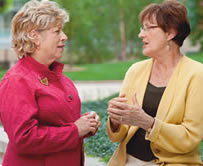Demanding Better
U-M's Breast Cancer Advisory & Advocacy Committee members work to improve care for future survivors

Every October, the world glows pink with Breast Cancer Awareness Month. That pink is as synonymous with breast cancer as orange is with Halloween wouldn't have been possible without the tireless advocacy of breast cancer survivors.
Each year, millions turn out to support efforts to put an end to breast cancer. We talked with Ruth Freedman and Maria Lyzen, co-chairs of the University of Michigan Rogel Cancer Center's Breast Cancer Advisory and Advocacy Committee, to find out what can be learned from the power of the pink ribbon movement.
Q: Let's start by talking about what kind of work the Breast Cancer and Advocacy Committee does.
Maria: The committee was formed to provide input to University of Michigan researchers as they design new studies. Our goal is to represent the patients' point of view: How can we make it easier for patients to participate in a clinical trial? Could a researcher consider reducing the number of scans required for a study so that a patient would only have to travel to the Rogel Cancer Center three times instead of four times?
Ruth: We see our role as working on projects to improve breast cancer care as a whole. For example, we learned from an excellent U-M occupational therapist that many insurance companies don't provide adequate coverage for treatment of lymphedema, a common side effect of breast cancer surgery that causes painful swelling in the arms. We worked with this occupational therapist to gather scientific evidence to show that certain interventions to treat this condition should be covered by insurance. We convinced the University of Michigan to include this coverage for its employees -- both going forward and retroactively. We hope that this will become a model for other insurance programs.
Q: Breast cancer survivors, in general, seem to be leading the charge in terms of advocacy. Why do you think this is?
Ruth: We're all assertive women and not afraid to speak up about issues that are important to us. We owe a lot to the founders of the National Breast Cancer Coalition (NBCC), a grassroots organization formed 20 years ago to raise awareness, provide scientific and advocacy education for the lay person, lobby for increased research funding and participate in scientific and regulatory decisions impacting breast cancer survivors.
Maria: Also, women are often the pillars of their families. Sometimes we've seen that women with breast cancer don't get the support they need from spouses or children, so women have bonded to form a support network to help other women.
Q:So you think that breast cancer advocacy is unique in some ways because of its specific impact on women?
Ruth: I think it's part of our acculturation as women to be caretakers, to be nurturing. We do this for ourselves, our daughters and our sisters. I really do think we need to give credit to the NBCC, though, as they've really helped to politicize women and empower them to be assertive.
Q: Why did you personally become involved in advocacy?
Maria: After working in public health as a nurse, I was startled to find that the same two drugs I'd seen administered for breast cancer when I was a student in 1964 were the same two drugs I received when I was diagnosed in 2001. There has been some progress, but why hasn't there been more? I also watched as younger women were diagnosed with breast cancer. They had to take two years out of their lives for treatment, which was often devastating to their family lives and their financial stability. I wanted to get involved to help draw attention to this important problem.
Ruth: For me, I come from a very political background. It's in my roots. I believe in community organizing. When I learned about breast cancer advocacy, it seemed natural to put my energy behind it.
Q: What do you think survivors gain from it?
Maria: For me, it's about being of service to others. At first, I didn't want to think about breast cancer after I had finished treatment. But after I was healed and well enough, the question of how I could be of service to others kept bubbling up. I was never taught to lead or be an advocate, but this became my passion.
Q: What do you need to know to become an advocate? How can you educate yourself?
Ruth: Breast cancer survivors are welcome to join our committee. We also recommend educational opportunities offered by the National Breast Cancer Coalition's Project LEAD course, which provides scientific and advocacy background information. The National Coalition for Cancer Survivorship also offers advocacy training for people with interest in other cancer types. Also, talk to your doctor, as we have found that faculty members are often interested in partnering with patients to advance research. Empowering yourself to become an assertive, knowledgeable patient can only help to further the cause.
Read the Fall, 2011 issue of Thrive.
